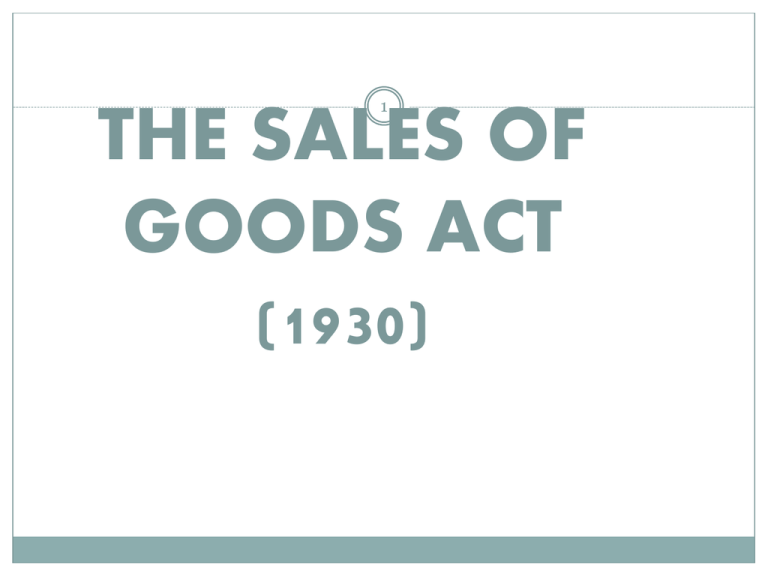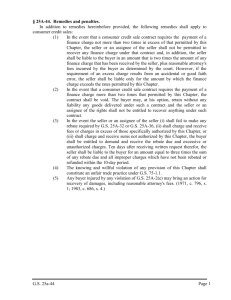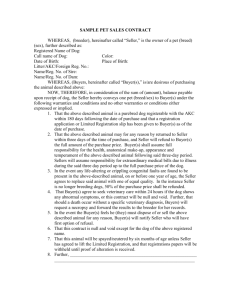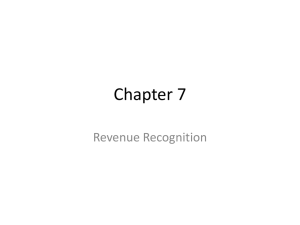THE SALES OF GOODS ACT (1930)
advertisement

1 THE SALES OF GOODS ACT (1930) INTRODUCTION 2 Before The Sales of Goods Act,transactions relating to sales and purchase of goods were regulated by The Indian Contract Act 1872. The Indian Sales Of Goods Act was passed in 1930 and sections 76 to 123 were repealed from The Indian Contract Act. Cont. 3 It came into force on 1st July 1930 and w.e.f 22nd Sept. 1963 the word Indian was removed and now the present act is called The Sales Of Goods Act 1930. This act extends to whole of INDIA except the state of Jammu n Kashmir. Sales of Goods Act does not Deals with:4 MORTAGAGE (which is dealt with under the Transfer of Property Act,1882) PLEDGE (which is dealt under The Contract Act,1872) This Act deals with goods but not with:a) Movable property e.g actionable claim or money b) Movable property other than goods DEFINATION 5 According to Section 4(1) of The Sales of Goods Act,1930. “contract of sales of goods is a contract whereby the seller transfer or agrees to transfer the property in goods to the buyer for a price” Contract of Sale is a generic term ,which includes both sales and an agreement to sell ESSENTIAL ELEMENTS OF THE ACT 6 BUYER AND SELLER ESSENTIAL ELETMENTS OF VALID CONTRACT PRICE GOODS TRANSFER OF PROPERTY A.BUYER AND SELLER 7 “BUYER” means a person who buys or agrees to buy good.[Section 2(1)] “SELLER” means a person who sells or agrees to sell the good.[Section 2(13)] A person cannot be a buyer as well as a seller as a person cannot buy his own goods B. GOODS 8 “GOODS” means every type of movable property other than actionable claim n money but it can include stock and shares,crops,lands etc. Cont. 9 ACTIONABLE CLAIM:- It means which can be enforced through the courts of Law, e.g. debt due. MONEY:- means the legal tender i.e. the currency of the country but not old coins coins. C. TRANSFER OF PROPERTY 10 “PROPERTY” means the general property in goods, and not merely a special property. General property in goods means ownership of the goods Special property on the goods means possession of the goods Cont. 11 Thus, there may be either a transfer of ownership of goods or an agreement to transfer the of the goods. The ownership may transfer either immediately on completion of sale or something in future in agreement to sell. d. price 12 For every sale or purchase their must be a price of the goods. PRICE means the MONEY CONSIDERATION for the sale of goods. i. ii. When there is no consideration,it amounts to gift and not sale However , the consideration may be partly in money and partly in goods because the law does not prohibited as such. E. ESSENTIAL ELEMENTS OF VALID CONTRACT 13 Essential elements of a valid contract as specified under Section 10 of Indian Contract Act,1872 must also be present. Offer and Acceptance b) Delivery and Payment c) Express or Implied a) CONTRACT OF SALE 14 Under Section 4(3) the Contract of Sale Includes:1) SALE:- Sale means where the ownership in goods is transferred. 2) AGREEMENT TO SELL :-Agreement to sell includes where the transfer of ownership in goods is to take place at a future time or subject to the fulfillment of some condition. Distinction between sale and agreement to sell 15 S.No BASIS SALE AGREEMENT TO SELL 1. Transfer of ownership Transfer of ownership of goods takes place immediately. Transfer of ownership of goods takes place in future times. 2. Executed or Executory It is an executed contract. It is an executory contract because something remains to happen. 3. Conveyance of Property Buyer gets the right to enjoy the goods against whole of the world. It creates jus in rem(Right against property) Buyer does not get such right to enjoy the goods. It only creates jus in personam (Right against person) Cont. 16 4. Transfer of Risk Transfer of risk* of loss of goods takes place immediately as the ownership is been transferred. As a result in case of destruction of goods, the loss shall be beared by the buyer. (Risk*-Risk follows ownership) Transfer of risk of loss of goods does not takes place because the ownership is not transferred. As a result, in case of destruction of goods the loss shall be borne by the seller. GOODS 17 U/s 2(7) GOODS MEANS “GOODS” means every type of movable property other than actionable claim n money but it can include stock and shares,crops,lands etc.” ACTIONABLE CLAIM:- It means which can be enforced through the courts of Law, e.g. debt due. MONEY:- means the legal tender i.e. the currency of the country but not old coins IMMOVABLE PROPERTY TYPES OF GOODS 18 1.Existing goods 19 EXISTING GOODS means the goods ,which are either owned or possessed by the seller at the time of contract of sale. Existing goods are of 3 types: a) Specific goods b) Ascertained goods c) Unascertained goods 2.Future goods 20 FUTURE GOODS means goods to be manufactured or produced or acquired by the seller after the making of the contract of sale. There is an agreement to sell only. For Example:-X will sell the goods to Y all the crops to be grown at Haryana in his farm. 3.Contingent goods 21 CONTINGENT GOODS means those goods,acquition of which by the seller depends upon a contingency, which may or may not happen. For example:-X agrees to sell to y all the crops to be grown at Z’s farm in Haryana during the year 2007 season for sum of 1 lakh rupees,if Z sells the crops. REFERENCE 22 THE PREESENTATION IS MADE FROM THE MODULE GIVEN IN THE COURSE OF CHARTED ACCOUNTANT. 23 Thank You











